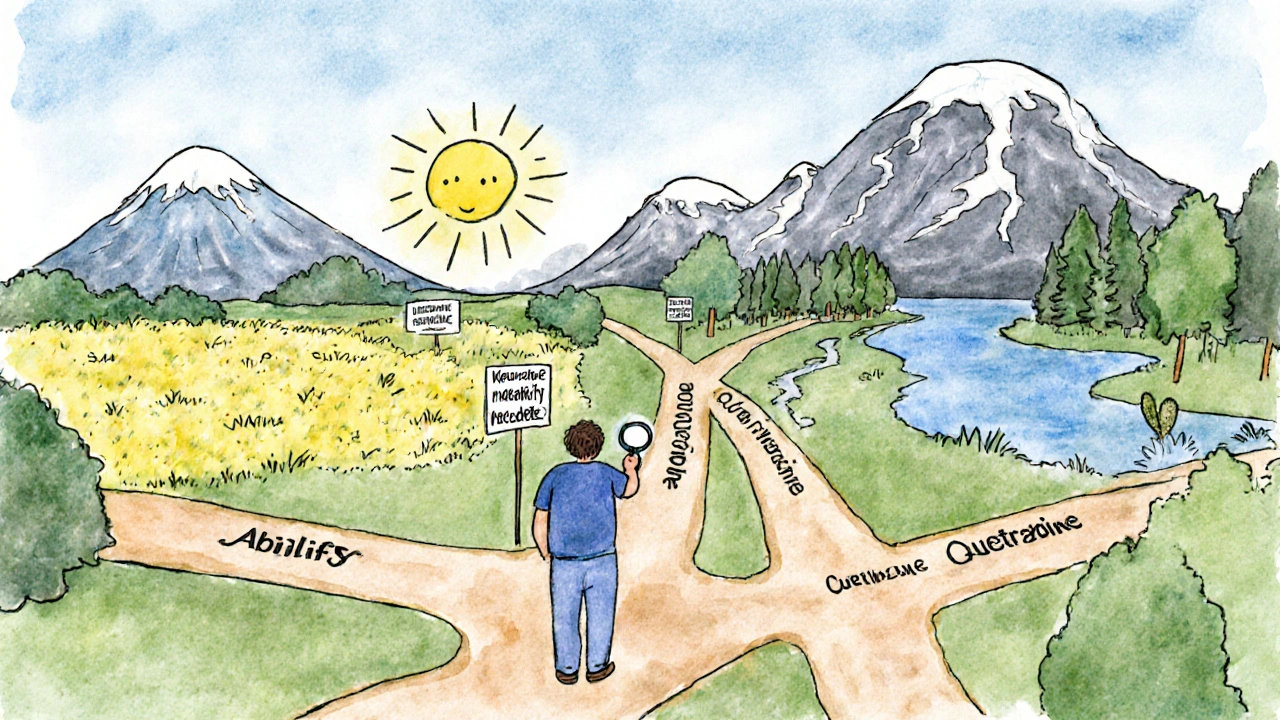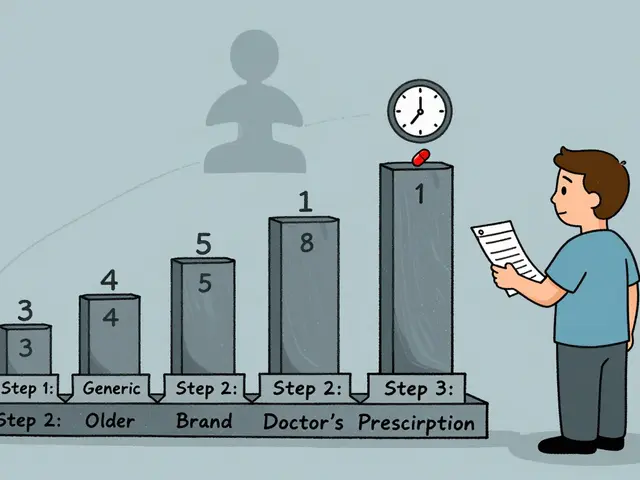Antipsychotic Medication Comparison Tool
Find Your Best Medication Match
This tool helps compare Abilify (aripiprazole) with other antipsychotic medications based on your specific symptoms, health conditions, and lifestyle. Select your priorities to see which alternatives might work best for you.
Your Situation
Personalized Medication Comparison
Recommended Alternative
Key Comparisons
When you're managing schizophrenia, bipolar disorder, or depression that hasn't responded to other treatments, Abilify (aripiprazole) is often the first name your doctor mentions. But it’s not the only option-and for many people, it’s not the best fit. Side effects like weight gain, restlessness, or drowsiness can make it hard to stick with. That’s why so many patients and clinicians look at alternatives. The question isn’t just Abilify vs. other drugs-it’s which one gives you stability without stealing your quality of life.
How Abilify Works (And Why It’s Popular)
Abilify is a partial dopamine agonist, which means it doesn’t just block dopamine like older antipsychotics. Instead, it gently adjusts dopamine levels-boosting it where it’s low and calming it down where it’s too high. This unique mechanism makes it useful for both schizophrenia and bipolar disorder, and even as an add-on for major depression.
It’s FDA-approved for:
- Schizophrenia in adults and teens (13+)
- Bipolar I disorder (manic or mixed episodes) in adults and children (10+)
- Major depressive disorder (as an add-on to antidepressants)
- Irritability linked to autism in children (6+)
Many people start on Abilify because it’s less likely to cause extreme sedation or metabolic issues than older drugs. But that doesn’t mean it’s side-effect free. About 20% of users report akathisia (inner restlessness), 15% gain weight over time, and some develop tardive dyskinesia after long-term use. That’s why alternatives matter.
Quetiapine (Seroquel): The Sedating Alternative
If you struggle with insomnia or severe anxiety along with your mood symptoms, quetiapine might be a better fit. It’s a potent sedative-many people take it just to sleep. It’s also approved for bipolar depression and schizophrenia.
Compared to Abilify:
- Pros: Stronger sleep aid, effective for depressive episodes in bipolar disorder, lower risk of akathisia
- Cons: High risk of weight gain (average 5-10 lbs in 6 weeks), increased blood sugar, daytime drowsiness
A 2023 study in the Journal of Clinical Psychiatry found quetiapine led to better sleep and mood stabilization in 68% of bipolar patients-but 42% gained over 10% of their body weight within a year. If you’re already overweight or have prediabetes, this isn’t a safe swap.
Risperidone: The Older Workhorse
Risperidone has been around since the 1990s and is still widely used. It’s cheaper, generic, and effective for psychosis and aggression. It’s approved for schizophrenia, bipolar mania, and irritability in autism.
How it stacks up against Abilify:
- Pros: Stronger antipsychotic effect, lower cost, proven long-term safety data
- Cons: Higher risk of movement disorders (tremors, stiffness), elevated prolactin (can cause breast enlargement, missed periods, low libido)
Unlike Abilify, risperidone doesn’t help with depression. If you’re on Abilify for depressive symptoms, switching to risperidone might make things worse. Also, the movement side effects can be permanent if not caught early. Blood tests to check prolactin levels are recommended every 6 months if you’re on this drug.
Olanzapine (Zyprexa): Effective But High Risk
Olanzapine is one of the most potent antipsychotics available. It’s very effective for severe psychosis and mania. But it’s also notorious for metabolic side effects.
Abilify vs. olanzapine:
- Pros: Fast-acting, excellent for acute mania, works well for treatment-resistant cases
- Cons: Average weight gain of 15-20 lbs in 3 months, high risk of type 2 diabetes, elevated cholesterol
Studies show olanzapine outperforms Abilify in reducing psychotic symptoms-but only if you can tolerate the weight gain. A 2024 meta-analysis found that 74% of patients on olanzapine gained more than 7% of their body weight within 12 weeks. That’s why doctors now avoid it as a first-line choice unless other drugs have failed.
Lurasidone (Latuda): The Weight-Friendly Option
If weight gain is your biggest fear, lurasidone might be your best alternative. It’s approved for bipolar depression and schizophrenia. Unlike most antipsychotics, it doesn’t trigger insulin resistance or significant weight gain.
Compared to Abilify:
- Pros: Minimal weight gain (average 1-2 lbs), low risk of metabolic issues, no sedation or akathisia in most users
- Cons: Must be taken with food (at least 350 calories), less effective for mania, can cause nausea or dizziness
A 2023 trial in The American Journal of Psychiatry showed lurasidone was just as effective as Abilify for bipolar depression-but patients on lurasidone lost an average of 1.3 lbs over 6 months. That’s rare for antipsychotics. It’s also less likely to cause high cholesterol or blood sugar spikes.
Ziprasidone (Geodon): The Middle Ground
Ziprasidone is less commonly prescribed but has a unique profile. It’s effective for psychosis and mood swings, and it’s one of the few antipsychotics that doesn’t cause weight gain-some patients even lose weight.
Abilify vs. ziprasidone:
- Pros: No weight gain, low risk of diabetes, minimal sedation
- Cons: Can cause QT prolongation (heart rhythm issue), requires ECG monitoring, needs to be taken with food, may cause dizziness
It’s not ideal for people with heart conditions or those on other drugs that affect heart rhythm. But if you’re young, healthy, and want to avoid weight gain, ziprasidone is one of the few antipsychotics that won’t change your body composition.
Cariprazine (Vraylar): The New Contender
Cariprazine is newer and works similarly to Abilify-but more selectively. It targets dopamine D3 receptors, which may help with negative symptoms of schizophrenia like apathy and social withdrawal.
How it compares:
- Pros: Better for depressive and negative symptoms, lower risk of akathisia than Abilify, moderate weight gain
- Cons: Expensive, not always covered by insurance, can cause restlessness or nausea
A 2024 study comparing cariprazine and aripiprazole in bipolar depression found cariprazine had a slightly higher response rate (52% vs. 45%) and fewer patients dropped out due to side effects. It’s becoming a top choice for those who need long-term mood stabilization without the metabolic burden of olanzapine or quetiapine.

What to Consider When Switching
Switching antipsychotics isn’t like changing painkillers. You can’t just stop one and start another. Abruptly stopping Abilify can cause rebound psychosis, nausea, or insomnia. The process usually takes 2-6 weeks.
Here’s what your doctor should do:
- Gradually reduce your Abilify dose over 1-2 weeks
- Start the new medication at a low dose
- Overlap both drugs for 1-2 weeks to avoid withdrawal
- Monitor for new side effects or worsening symptoms
Don’t try to switch on your own. Even small changes can trigger relapse. Keep a symptom journal during the transition-note sleep, mood, energy, and any unusual movements.
Non-Drug Options to Consider
Medication isn’t the whole story. Studies show combining antipsychotics with therapy improves outcomes by 40%. Cognitive behavioral therapy (CBT) helps people manage delusions and negative thoughts. Family therapy reduces stress triggers. Regular exercise can reduce agitation and improve sleep.
Some patients also benefit from:
- Omega-3 fatty acids (1,000-2,000 mg/day)-shown to reduce symptom severity in early psychosis
- High-dose vitamin D (if deficient)-linked to better mood stability
- Consistent sleep schedules-critical for preventing mania and psychosis
These aren’t replacements for medication-but they make meds work better and reduce the dose you need.
Who Should Stick With Abilify?
Abilify still has a place. If you’re on it and:
- Feel stable with no major side effects
- Don’t gain weight or feel restless
- Can afford the cost (it’s generic now, so it’s cheaper than before)
Then there’s no reason to switch. Many people do well on it for years. The goal isn’t to find the “best” drug-it’s to find the one that works for you without costing you your health.
Final Thoughts
There’s no single best antipsychotic. What works for one person might fail for another. Abilify is a good middle-ground option-but it’s not perfect. Lurasidone and cariprazine offer better metabolic profiles. Quetiapine helps with sleep but adds weight. Ziprasidone avoids weight gain but needs heart monitoring.
Your choice should be based on:
- Your symptoms (mania? depression? psychosis?)
- Your health risks (diabetes? heart issues? obesity?)
- Your lifestyle (can you take meds with food? do you need to stay alert at work?)
- Your past experience (did a drug fail before? Did side effects ruin your day?)
Talk to your doctor. Bring your symptom log. Ask about blood tests. Ask about alternatives. You deserve a treatment plan that doesn’t just control symptoms-it lets you live.
Can I switch from Abilify to a non-medication treatment?
No, you shouldn’t stop Abilify without medical supervision. Antipsychotics are not like antidepressants-you can’t just taper off and rely on therapy alone if you have schizophrenia or severe bipolar disorder. Therapy, diet, and sleep help, but they’re supplements, not replacements. Stopping abruptly can cause a dangerous relapse.
Which alternative to Abilify has the least side effects?
Lurasidone (Latuda) has the best side effect profile for weight and metabolism. It rarely causes weight gain, high blood sugar, or cholesterol issues. Ziprasidone (Geodon) is also low-risk for weight gain but requires heart monitoring. Both are better than quetiapine or olanzapine if you’re concerned about metabolic health.
Is Abilify better than risperidone?
It depends. Abilify is better for people who want to avoid movement disorders or high prolactin levels. Risperidone works better for acute psychosis and is cheaper. But if you’ve had tremors or breast changes on risperidone, Abilify is usually the safer long-term choice.
How long does it take to see results when switching meds?
It usually takes 2-6 weeks to see full effects from a new antipsychotic. Some people feel better in 1-2 weeks, but full stabilization takes longer. Don’t give up too soon. The transition phase can be rough-mood swings, sleep issues, or nausea are common. Keep your doctor updated.
Are generic versions of these drugs as good as brand names?
Yes. Generic aripiprazole, quetiapine, risperidone, and lurasidone are just as effective as brand names. The FDA requires them to meet the same standards. The only difference is cost. Generic Abilify costs about $10-$30 per month. Brand-name versions can be $300+.
Can I take Abilify with antidepressants?
Yes, Abilify is FDA-approved as an add-on to antidepressants for treatment-resistant depression. It’s commonly used with SSRIs like sertraline or fluoxetine. But combining it with other antipsychotics or drugs that affect dopamine can increase side effects. Always check for interactions with your pharmacist.







Cole Brown
November 1, 2025 AT 12:06 PMBeen on Abilify for 4 years. No weight gain, no restlessness. Just steady. If it ain't broke, don't fix it.
Danny Pohflepp
November 1, 2025 AT 13:54 PMDid you know the FDA approved Abilify because pharma bribed regulators with offshore accounts? They’re hiding the real side effects-like soul erosion. The ‘partial agonist’ label? A marketing lie. They want you dependent. Wake up.
Halona Patrick Shaw
November 2, 2025 AT 19:50 PMMan, I switched from Abilify to lurasidone last year. Lost 18 lbs. Started hiking again. My dog noticed. He used to nudge me when I was zoning out-he’s now begging me to throw the ball. Life came back. Not just meds, man. Life.
Elizabeth Nikole
November 4, 2025 AT 16:48 PMEveryone’s so quick to say ‘just switch meds’ like it’s a Netflix subscription. You don’t just swap pills and magically feel human again. Some of us are broken beyond what drugs can fix. And now we’re supposed to ‘try therapy’ like it’s a spa day. 😒
LeAnn Raschke
November 6, 2025 AT 16:38 PMThanks for laying this out so clearly. I’m helping my brother navigate his switch from risperidone to cariprazine, and this helped us ask the right questions at his appointment. You’re not just listing drugs-you’re giving people back their dignity.
Adorable William
November 7, 2025 AT 23:33 PMOf course lurasidone is ‘weight-friendly’-it’s barely even absorbed. The real antipsychotics are the ones that hit the D2 receptors hard. You want efficacy? You want to actually silence the voices? Then you need olanzapine or clozapine. The rest are just placebo with a side of expensive marketing. And yes, I’ve read the journals. All of them.
Suresh Patil
November 9, 2025 AT 08:16 AMIn India, we use risperidone because it’s cheap and works. But my cousin had terrible tremors. We switched to aripiprazole-no movement issues. Still, we don’t have access to lurasidone or cariprazine. It’s a luxury. Maybe one day.
Ram Babu S
November 9, 2025 AT 09:38 AMBeen through 5 meds over 12 years. Abilify was the first that didn’t make me feel like a zombie. I still take it. No drama. No weight gain. Just calm. Sometimes, that’s enough. Don’t chase perfection. Chase stability.
Kyle Buck
November 10, 2025 AT 10:11 AMWhile the pharmacodynamic profiles of partial dopamine agonists like aripiprazole and cariprazine are theoretically superior due to their functional selectivity at D3 receptors, the clinical translatability remains confounded by interindividual variability in CYP2D6 metabolism. Furthermore, the metabolic safety advantage of lurasidone is contingent upon concomitant caloric intake, which introduces a significant adherence variable. The literature remains underpowered for long-term comparative effectiveness.
Amy Craine
November 10, 2025 AT 13:25 PMI’m a therapist, and I’ve seen patients thrive when meds and therapy work together. One guy on lurasidone started CBT and now runs marathons. Another on Abilify with DBT finally stopped isolating. It’s not just the drug-it’s the person behind it. Don’t underestimate the power of a good therapist and a consistent routine.
Alicia Buchter
November 11, 2025 AT 20:46 PMLurasidone? Cute. I tried it. Tasted like chalk and regret. And don’t even get me started on the ‘must eat 350 calories’ thing. I’m not a toddler. Also, my insurance denied it. So I’m back on Abilify. Thanks for nothing, healthcare system.
MaKayla VanMeter
November 12, 2025 AT 17:45 PMABILIFY IS A SCAM 💀💀💀 I tried it and my soul left my body for 3 days. I’m now on CBD oil and crystals. My cat says it’s working better. 🐱✨ #mentalhealthisabusiness
Doug Pikul
November 13, 2025 AT 07:26 AMYo, I was on ziprasidone. Heart monitor? Nah. I just got a Fitbit. Kept track of my pulse. If it spiked, I stopped. Worked. No weight gain. No drowsiness. I’m alive. Don’t let the doctors scare you. You got this. 💪
anthony perry
November 15, 2025 AT 04:02 AMLurasidone works. No weight gain. Takes food. That’s it.
Cole Brown
November 16, 2025 AT 00:51 AMThat’s the thing. I didn’t switch because I was told to. I switched because I felt like I was losing myself. Now I’m back to normal. Not perfect. Just… me.